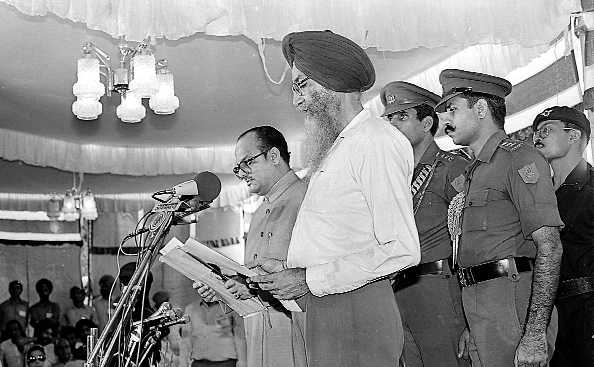Surjit Singh Barnala, who almost became Prime Minister in the mid-1990s but for his party ditching him, was a moderate Akali politician and played a role in the Rajiv-Longowal Accord that catapulted him to the Chief Minister’s seat in Punjab during its worst period of militancy.
Painter, politician and author, 91-year-old Barnala was among the few who held various posts, including that of Chief Minister, Governor and Union Minister.
Barnala was a candidate of the BJP and its allies in the election of the Vice-President of India in 1997. But in the previous year, he almost emerged as a consensus candidate for prime ministership when a motley combine of parties formed the United Front after the defeat of the Congress.
His party Akali Dal, however, chose to go with the BJP, which had just lost power after 13 days in government.
When Punjab was rocked by militancy in the 1980s, Barnala stood by another moderate Akali leader Sant Harchand Singh Longowal, who signed the Punjab Peace Accord in 1985 with Rajiv Gandhi, months after he had become Prime Minister.
Barnala was elected from the Barnala constituency during the 1985 Assembly polls held after the signing of the Accord. He was unanimously elected leader of the Shiromani Akali Dal legislature party on September 27, 1985. He remained Chief Minister till May 11, 1987 during the peak period of militancy.
He was elected acting president of SAD on August 25, 1985 following the assassination of Longowal by terrorists.
Barnala was appointed Governor of Tamil Nadu, a post he held from May 1990 to February 1991. He was TN Governor for a second time from 2004 to 2011. In his first term, he had famously refused to recommend dismissal of the DMK government in 1991 when the late Chandrashekhar was PM for a short time. When he was transferred to Bihar following his refusal, he chose to resign as Governor.
Born on October 21, 1925, in Ateli village in Gurgaon district of joint Punjab, Barnala did his schooling from Nabha and graduation from Lucknow. He was involved in the Quit India Movement of 1942 after which he practised law for some years.
He was a five-time member of Punjab Assembly — 1967, 1969, 1972, 1980 and 1985 — and twice a member of the Lok Sabha in 1977 and 1998. He entered politics in 1952 and unsuccessfully contested from Dhanaula, losing by just three votes. Barnala was Education Minister in the Gurnam Singh government and was instrumental in setting up of Guru Nanak Dev University at Amritsar.
He served as Union Agriculture Minister in the Morarji Desai-led Janata Party government from 1977 to 1980.
He was also Union Minister for Consumer Affairs, Power, Chemical and Fertilisers and Rural Development and signed the historic Ganga Waters Agreement (Farakka Agreement) with Bangladesh.
In 1998, Barnala was again elected to Parliament and became the Minister for Chemical and Fertilisers and Food and Consumer Affairs in the Atal Behari Vajpayee Cabinet.
Following the rift with Parkash Singh Badal and bifurcation of the SAD, he resigned from the post of party president but was later on again made president.
He was also a former Governor of Uttarakhand and Andhra Pradesh, besides being Lieutenant Governor of Andaman and Nicobar Islands. After his differences with Badal, he became patron of a four-party alliance and formed the “Sanjha Morch” in Punjab, but it failed to make any impact.
Barnala authored “Story of an Escape”, which was translated from English to Punjabi, Hindi and Urdu. His second book “My Other Two Daughters” was also transliterated in braille by Kunwar Singh Negi.
Barnala had faced tragedies on the personal front. His youngest son Neelinder died in a road accident in 1996 and his daughter Amrit Kaur died of cancer in 2012. He is survived by his wife Surjit Kaur and two sons Jasjit and Gaganjit. — PTI
Unlock Exclusive Insights with The Tribune Premium
Take your experience further with Premium access.
Thought-provoking Opinions, Expert Analysis, In-depth Insights and other Member Only Benefits
Already a Member? Sign In Now










